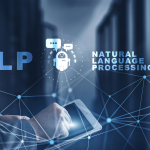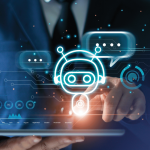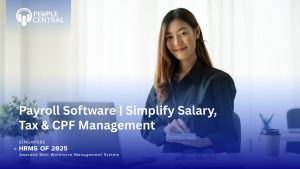Are you a Singapore professional looking to revolutionize your HRMS and payroll processes? In this article, we will explore the top 10 ingenious ways to leverage the power of Artificial Intelligence (AI) to enhance your HRMS and streamline your payroll systems. From automating repetitive tasks to gaining valuable insights from data analytics, AI can transform the way you manage your workforce, ultimately leading to increased efficiency and productivity.
Benefits of using AI in HRMS & Payroll
Using AI in HRMS and payroll systems has many revolutionary benefits. Here are some of them:
- Greater Efficiency – AI can automate regular tasks like data entry, calculations, and generating reports, saving time for HR personnel.
- Better Accuracy – AI algorithms can reduce human errors in data handling and calculations, ensuring exact records and salary computations.
- Cost Savings – AI-powered systems reduce manual input and streamline processes, eliminating unnecessary paperwork, reducing administrative overheads, and optimizing resource utilization.
- Improved Decision-making – AI technologies provide HR pros access to real-time insights and analytics from a lot of data. This assists them in making informed decisions about employee recruitment, performance evaluation, salary adjustments, and talent management strategies.
- Personalized Employee Experience – With AI algorithms analyzing employee data like performance metrics, preferences, and career aspirations, HR departments can create unique experiences. This leads to higher employee satisfaction and retention rates.
Plus, AI-driven HRMS and payroll systems can adapt to changing compliance regulations and ensure data privacy and security.
Pro Tip: When implementing AI in HRMS & Payroll systems, ensure training is provided to both employees and admins. This will help maximize the system’s potential and minimize any transition challenges.
Top 9 ways to use AI in HRMS & Payroll
AI has changed many industries, including HRMS & Payroll. AI can upgrade efficiency and accuracy while cutting manual efforts and expenses. Here are the 9 Ways to use it for the best:
1. AI-driven Candidate Sourcing
Finding the right talent can be time-consuming and challenging. AI can come to the rescue by automating candidate sourcing. By analyzing job descriptions and qualifications, AI algorithms can identify the most suitable candidates from various sources, including job portals, social media, and professional networks.
2. Seamless Recruitment with AI
AI streamlines the entire recruitment process, from screening resumes to conducting interviews. Chatbots powered by AI can engage with applicants, answer their queries, and schedule interviews. This ensures a seamless experience for both candidates and recruiters.
3. Personalized Onboarding with AI
Onboarding is crucial for new hires to adapt quickly to the company culture and their roles. AI can customize onboarding programs based on individual needs, providing relevant training modules, orientation schedules, and access to necessary resources.
4. AI-powered Performance Management
Traditional performance reviews can be subjective and prone to bias. AI-driven performance management systems analyze employee data to provide objective evaluations. This leads to fair and accurate performance assessments, enabling better feedback and growth opportunities for employees.
5. AI-based Learning and Development
Continuous learning is essential for employee growth and skill development. AI-powered learning platforms can recommend personalized training programs based on an employee’s strengths, weaknesses, and career aspirations, ensuring a more efficient learning experience.
6. Efficient Time and Attendance Tracking
AI can simplify time and attendance tracking, reducing administrative burdens. Facial recognition and geolocation technologies can be utilized to accurately record employees’ working hours, eliminating manual attendance processes.
7. AI for Payroll Management
AI can optimize payroll management by automating calculations and ensuring compliance with labor laws and regulations. It can also detect errors and discrepancies, preventing costly mistakes and saving time for HR professionals.
8. Enhancing Employee Engagement
Employee engagement is crucial for retention and productivity. AI-powered sentiment analysis tools can gauge employee satisfaction and well-being, allowing HR to address issues promptly and create a positive work environment.
9. AI-driven Predictive Analytics
Predictive analytics leverages AI algorithms to forecast HR trends and identify potential issues before they arise. By analyzing past data, AI can predict employee turnover, training needs, and performance patterns, enabling proactive decision-making.
Conclusion
Incorporating AI into your HRMS and payroll processes can work wonders for your organization. From automating recruitment to optimizing performance management, AI offers numerous benefits that empower HR professionals to focus on strategic initiatives. Embrace the power of AI today to stay ahead in the ever-evolving HR landscape.
FAQs
Ques 1. What is AI in HRMS & Payroll?
Ans 1. AI in HRMS & Payroll refers to the integration of artificial intelligence technologies into human resource management systems and payroll processes. It involves using AI algorithms and machine learning techniques to automate and streamline various HR and payroll tasks.
Ques 2. What are the benefits of using AI in HRMS & Payroll?
Ans 2. The benefits of using AI in HRMS & Payroll include improved accuracy and efficiency in payroll processing, reduction in manual errors, better compliance with regulations, enhanced data security, advanced analytics and reporting capabilities, and the ability to make data-driven decisions in HR and payroll management.
Ques 3. How can AI be used in HRMS & Payroll?
Ans 3. AI can be used in HRMS & Payroll in various ways, such as automating payroll calculations and deductions, analyzing employee data to identify trends and patterns, providing personalized employee self-service portals, automating recruitment and onboarding processes, predicting employee performance and engagement, and improving compliance with labor laws and regulations.
Ques 4. Is AI in HRMS & Payroll only beneficial for large organizations?
Ans 4. No, AI in HRMS & Payroll can be beneficial for organizations of all sizes. While large organizations may have more complex HR and payroll processes, AI can also help small and medium-sized businesses automate manual tasks, reduce administrative burden, and improve overall efficiency in managing HR and payroll functions.








 5
5


























